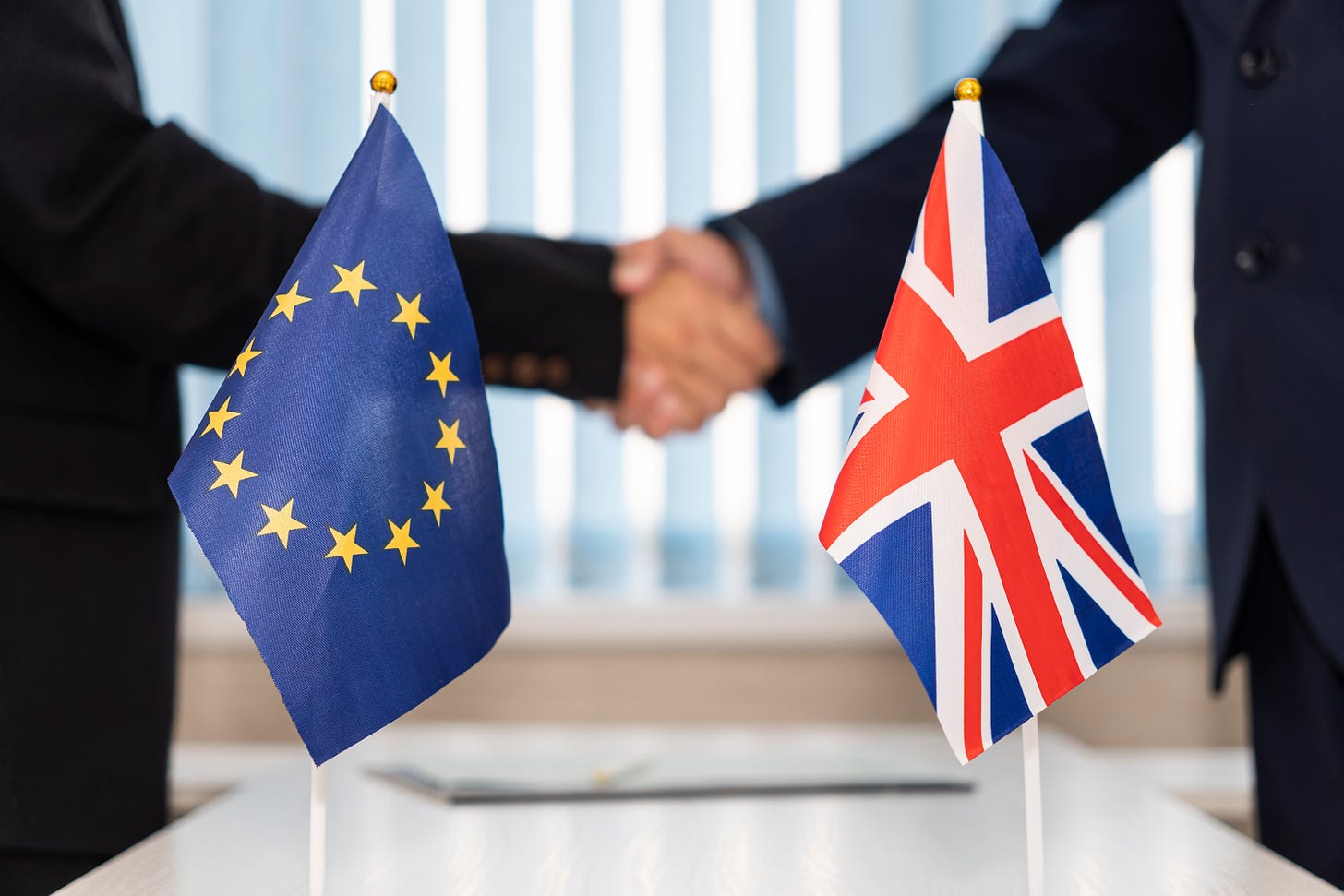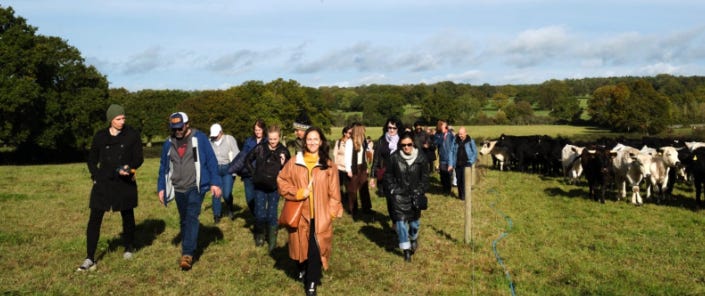Reclaiming Our Place Beyond Brexit: Why Keir Starmer Must Lead with a Bold Pro-EU Vision
Also this week: Sustainable Fashion Week celebrating the launch of the new National Centre for Fashion and Sustainability at Bath Spa University
Words by Michelle Kazi
In the corridors of Westminster, a troubling paradox has taken root. Despite possessing a formidable working majority of 167 seats, the Labour government under Prime Minister Keir Starmer continues to tiptoe through policy decisions, acting more like a party in opposition than one with the mandate to reshape the nation’s future. Nowhere is this more evident than in their refusal to engage with the EU’s Youth Mobility Scheme—an initiative proposed by the EU Commission in April as " The withdrawal of the UK from the EU has resulted in decreased mobility between the EU and the UK. This situation has particularly affected the opportunities for young people to experience life on the other side of the Channel and to benefit from youth, cultural, educational, research and training exchanges" That represents not just a policy decision, but a broader vision for the future of the UK in a post-Brexit world.
The government's hesitation on this front is puzzling, if not outright alarming. With 68% of the British public in favour of such a scheme, according to recent polls, there is clear popular support for initiatives that would re-open the door to Europe for young people. And yet, the government seems paralysed, haunted by the spectre of far-right criticism, more concerned with appeasing a vocal minority than capitalising on an opportunity that could benefit the country on multiple fronts.
Youth Mobility: A Critical Pillar for the Future
The EU's Youth Mobility Scheme is not just about the free movement of young people; it is about shaping the future workforce, fostering innovation, and sustaining the economic dynamism that the UK prides itself on. For the creative industries, which contributed over £60 billion annually to the UK economy in 2024—accounting for nearly half of the total economic impact from the UK’s creative sector—the ability to attract, retain, and collaborate with talent across borders is indispensable. The creative sector thrives on diversity—of thought, of culture, of experience. By turning their back on this scheme, the government risks stifling the very lifeblood of one of the nation’s most vibrant sectors.
Consider the stories that fill our newsfeeds: artists, designers, and entrepreneurs who find their inspiration in the cross-pollination of ideas across Europe. These young people are the engine of the creative economy, driving growth and innovation in ways that ripple across the entire society. Denying them the opportunity to work, study, and collaborate freely within the EU is not just a missed opportunity; it is a self-inflicted wound, a deliberate narrowing of horizons at a time when the world demands openness and collaboration.
A King's Speech That Fell Short
When Labour came to power, it did so on the back of promises to revitalise education, foster creativity, and champion the arts. Back in 2018 designer Ashish, who recently dressed Taylor Swift for her UK concerts, spoke to our CEO Tamara Cincik in a podcast about the importance to creativity of freedom of movement and how vital it was to his success but also to the team he works with. These promises were enshrined in their manifesto, which positioned the creative industries as central to the UK's future. However, the recent King's Speech offered little reassurance to those who hoped for bold, visionary leadership in this area. While the speech covered a broad range of economic and social policies, it conspicuously lacked a robust commitment to the creative sectors and the international collaborations that are vital to their success.
This omission is not merely symbolic; it signals a concerning lack of prioritisation. The King's Speech should have been the moment to reaffirm the government's commitment to youth mobility and the creative industries. Instead, it felt like a retreat into the familiar safety of domestic issues, with little regard for the broader, global challenges that the UK must confront. Despite the rhetoric of a "Global Britain," the speech missed an opportunity to place creativity and international cooperation at the heart of the UK’s future strategy.

The Lost Promises of Brexit
The stark reality is that the tangible benefits promised by Brexit have not materialised. The fashion industry, a critical component of the UK’s economic and cultural identity, has been particularly hard-hit. Our recent Fashion Economic Value Report 2024 highlights ongoing struggles: increased costs, complex logistics, and barriers to accessing vital talent from the EU. Despite government rhetoric, the supposed freedoms gained from Brexit have, in many cases, translated into burdensome restrictions that stifle creativity and innovation.
The Brexit Follow-Up Report by Fashion Roundtable underscores the severity of these impacts. The loss of freedom of movement, coupled with the challenges of new trade barriers, has disrupted supply chains and eroded the UK’s competitive edge in global fashion. The government’s refusal to address these issues head-on, opting instead for a defensive stance, has only exacerbated these problems. There have been no substantial wins to offset these losses, and the government's reluctance to engage with the EU Youth Mobility Scheme is yet another missed opportunity to mitigate the damage.
A Call for Proactive EU Engagement
Now, more than ever, the UK must pivot from its defensive posture and embrace a proactive approach to EU engagement. This does not mean a return to the EU but rather a strategic collaboration that recognises our shared interests. The government should not be cowed by the fear of far-right backlash; instead, it should lead with the confidence that comes from knowing what is best for the country’s future.
A tangible step forward would be to reconsider participation in EU programmes like the Youth Mobility Scheme. This would not only provide young Britons with invaluable opportunities but also signal to the world that the UK is serious about being a global player, not an insular outpost.
Fashion Roundtable’s Vision for the Future
At Fashion Roundtable, we have consistently advocated for policies that support the creative industries and their role in driving economic growth. Our Sector Vision Report outlines clear recommendations for how the UK can remain a leader in global fashion, despite the challenges posed by Brexit. We call for frictionless travel for creatives, support for UK manufacturing, and a return to a STEAM-based education system that values the arts as much as science and technology.
Moreover, we believe that a closer alignment with the EU on creative and environmental standards is essential. As highlighted in our Brexit report, the UK cannot afford to fall behind in an industry that is inherently global. The government must recognise that protecting the creative sector is not a concession to Europe; it is a necessary step to secure the UK’s economic future.
Conclusion: A Personal Appeal to Prime Minister Keir Starmer
The UK stands at a crossroads. We can either continue down a path of isolation, clinging to outdated notions of sovereignty, or we can embrace a future built on collaboration, innovation, and global engagement. The creative industries, and indeed the entire economy, depend on the latter.
Prime Minister Starmer, with a majority that provides unprecedented legislative freedom, must seize this moment. Now is the time to lead with vision, not fear. The future of our young people, our industries, and our standing in the world depends on embracing our role within Europe. By driving forward with bold, progressive change, we can ensure that the UK’s creative industries remain at the forefront of global innovation and influence.
The EU Youth Mobility Scheme and the broader engagement with Europe are not threats but opportunities to secure the future prosperity of our nation. The government has the parliamentary numbers to push through these initiatives that will benefit the UK’s young people and creative industries alike.
Fashion Roundtable stands ready to support this opportunity for business and creative exchange alike, but it is up to the government to lead the way. Let us hope they do so, with the vision and confidence that their majority affords them.
Event: Sustainable Fashion Week x Bath Spa University upcoming events programme; 23-27th September 2024, Bath

Celebrating the launch of the new National Centre for Fashion and Sustainability, Sustainable Fashion Week and Bath Spa University will be hosting a week of activity at the Locksbrook Campus as the SFW Flagship Hub.
A range of activities will be taking place throughout the week which seek to engage, inspire and educate across a range of topics relating to sustainable fashion, including a series of practical workshops, a screening of the Nettle Dress film with a filmed directors Q&A, and a sustainable fashion panel discussion exploring the themes of heritage and how we can learn from the past to address the future of fashion.
A highlight of the programme is the incredible Red Dress by artist Kistie Macleod, which will be exhibited throughout the week on campus. A collaborative project totalling 380 embroiderers across 51 countries, the Red Dress is a testament to the heritage craft of embroidery, its power and capability for self expression. An exclusive opportunity to hear from the artist who led the project will be available on Tuesday 24th September.
View the full programme of events by visiting the SFW website and to book tickets.
Ticket Links:
All tickets are available to book on the Yuup platform.
Nettle Dress Film Screening + Q&A
Red Dress Talk by Kirstie Macleod
Sustainable Fashion Panel Discussion

Invitation: Ecolabelling Research; Help shape the direction of future policy and guidance on the design and implementation of ecolabels
The Department for Energy Security & Net Zero (DESNZ) and the Department for Environment, Food & Rural Affairs (Defra) have commissioned Verian, an independent research agency, to speak to businesses about their views on ecolabelling.
They will conduct research on how to best enable consumers, businesses and industry to make ‘green choices’ and choose the most sustainable option from a range of products. Ecolabels are any environmental information shown at the point of decision making that informs the decision-maker about the environmental qualities of a good, product, or service. They can help consumers make informed decisions, and support businesses to measure and communicate their environmental credentials, as laid out in the UK Government’s Powering Up Britain: Net Zero Growth Plan (2023) strategy.
The overall aim of the research is to understand how ecolabelling could best be implemented within different groups of goods/services, so that ecolabels are as effective as possible for consumers and are as practicable as possible for businesses. This will include exploring the potential for designing and implementing a universal ecolabel.
Have your say
This is a chance for you to help shape the direction of future policy and guidance on the design and implementation of ecolabels. It will also be an opportunity to feedback on the specific barriers and motivations for adopting ecolabels within your organisation/sector.
We would like to hear from decision-makers with relevant knowledge of sustainability and/or labelling issues in the context of their business. We anticipate this will vary according to individual business but, ideally, we are looking for the following:
• Micro/small businesses: Business owner
• Bigger SMEs/Large enterprises: Operations Director/Head of Supply Chain/Head of Sustainability/ etc.
This research aims to understand and explore the following:
• Sector/organisational attitudes to ecolabelling
• Experiences and expectations of adopting ecolabelling
• Perceptions of the feasibility and impact of adopting ecolabelling
• Feedback on potential designs, metrics, and presentations of ecolabels
How to get involved
If you fit the description of role and responsibilities mentioned and are interested in getting involved, please email Marios Zampetis at ecolabels@veriangroup.com to express your interest.
Event: Field Day with British Pasture Leather, 4th October 2024, Stevenage & Wellingborough
This Field Day presents a new understanding of leather by putting it in the context of positive local food and farming systems. The daylong programme is a complete journey of what lies behind British Pasture Leather.
The morning includes talks and tours on one of the UK's leading regenerative farms, joined by expert speakers, and after a delicious lunch of local food we see the process of leather being made at one of the few remaining leather "curriers" in the UK. This experiential programme is intended to activate all the senses, to provoke curiosity, and to inspire support for regenerative supply chains in the UK.
Venue: Coach travel is arranged for the day trip, starting point is Stevenage train station SG1 1XT, end location is Wellingborough train station NN8 1NA





